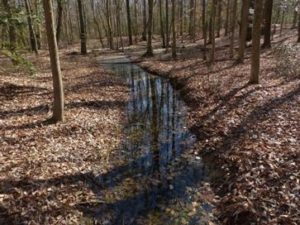Vernal Pools
By Steve Eisenhauer, Regional Director of Stewardship and Land Protection
Vernal pools are seasonal wetlands that are covered by shallow water intermittently in winter and spring, but may be completely dry in summer and fall. Often threatened by development or other changes in land and water use, they are unique environments that provide essential habitat for many rare and important plants and animals.
At our New Jersey preserves, Natural Lands Trust has been working to restore valuable vernal pool habitat for wetland creatures like wood frogs, turtles, salamanders, and other important species.
 At our Glades Wildlife Refuge in Cumberland County, staff installed “ditch plugs” in a series of woodland ditches on former agricultural land to keep fresh water from draining too quickly into the surrounding tidal marsh. The ditch plugs enhance existing vernal pools and as well as create new ones. They also help recharge groundwater, which staves off saltwater intrusion.
At our Glades Wildlife Refuge in Cumberland County, staff installed “ditch plugs” in a series of woodland ditches on former agricultural land to keep fresh water from draining too quickly into the surrounding tidal marsh. The ditch plugs enhance existing vernal pools and as well as create new ones. They also help recharge groundwater, which staves off saltwater intrusion.
On a recent survey of the area, I noted that the early warm weather brought the wood frogs out in large numbers, resulting in loud daytime calling of male frogs looking to impress females. A few days after the above photo was taken, two masses of wood frog eggs were found in the same location, attached to submerged sticks (below). The eggs will hatch in approximately three weeks, depending on temperature.


Enhanced habitat for wood frogs and other amphibians also benefits the animals that prey on them, such as Barred Owls and Red-shouldered Hawks (both listed as “threatened” species by New Jersey Department of Environmental Protection). Specialized plant species such as the cranefly orchid (Tipularia discolor, right) also thrive in wooded wetland areas. Restoration of vernal pool areas and other important habitats not only help protect our freshwater resources, but they ensure that a diversity of habitat types are available to support the unique biological communities that call the Delaware Watershed and Bayshore area home.
This project received support from the William Penn Foundation whose Delaware River Watershed Initiative is an unprecedented collaboration of more than 50 leading nonprofits–including Natural Lands Trust–to protect and restore water quality in Delaware River watershed. Informed by science, the Initiative aligns priorities for land protection and restoration projects in these ecologically significant areas.
